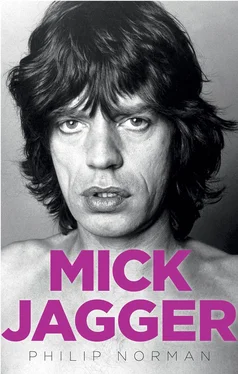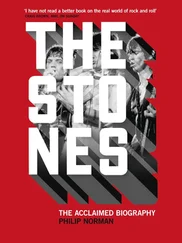Jagger is neither a Kentish name nor a London one – despite the City lawyer named Jaggers in Dickens’s Great Expectations – but originated some two hundred miles to the north, around Halifax in Yorkshire. Although its most famous bearer (in his ‘Street Fighting Man’ period) would relish the similarity to jagged , claiming that it once meant ‘knifer’ or ‘footpad’, it actually derives from the Old English jag for a ‘pack’ or ‘load’, and denotes a carter, peddler or hawker. Pre-Mick, it adorned only one minor celebrity, the Victorian engineer Joseph Hobson Jagger, who devised a successful system for winning at roulette and may partly have inspired a famous music-hall song, ‘The Man Who Broke the Bank at Monte Carlo’. The family could thus claim a precedent for hitting the jackpot.
No such mercenary aims possessed Mick’s father, Basil Fanshawe Jagger – always known as Joe – who was born in 1913 and raised in an atmosphere of clean-living altruism. Joe’s Yorkshireman father, David, was a village school headmaster in days when all the pupils would share a single room, sitting on long wooden forms and writing on slates with chalk. Despite a small, slender build, Joe proved a natural athlete, equally good at all track-and-field sports, with a special flair for gymnastics. Given his background and idealistic, unselfish temperament, it was natural he should choose a career in what was then known as PT – physical training. He studied at Manchester and London universities and, in 1938, was appointed PT instructor at the state-run East Central School in Dartford, Kent.
Situated in the far north-west of the county, Dartford is practically an east London suburb, barely thirty minutes by train from the great metropolitan termini of Victoria and Charing Cross. It lies in the valley of the River Darent, on the old pilgrims’ way to Canterbury, and is known to history as the place where Wat Tyler started the Peasants’ Revolt against King Richard II’s poll tax in 1381 (so rabble-rousers in the blood, then). In modern times, almost its only invocation – albeit hundreds of times each day – is in radio traffic reports for the Dartford Tunnel, under the Thames, and adjacent Dartford–Thurrock Crossing, the main escape route from London for south-coast-bound traffic. Otherwise it is just a name on a road sign or station platform, its centuries as a market and brewing town all but obliterated by office blocks, multiple stores and even more multiple commuter homes. From the closing years of Queen Victoria’s reign, traffic funnelled to Dartford was not only vehicular; an outlying village with the serendipitous name of Stone contained a forbidding pile known as the East London Lunatic Asylum until a more tactful era renamed it ‘Stone House’.
Early in 1940, Joe Jagger met Eva Ensley Scutts, a twenty-seven-year-old as vivacious and demonstrative as he was understated and quiet. Eva’s family originally came from Greenhithe, Kent, but had emigrated to New South Wales, Australia, where she was born in the same year as Joe, 1913. Towards the end of the Great War, her mother left her father and brought her and four siblings home to settle in Dartford. Eva was always said to be a little ashamed of her birth ‘Down Under’ and to have assumed an exaggeratedly upper-class accent to hide any lingering Aussie twang. The truth was that in those days all respectable young girls tried to talk like London débutantes and the royal princesses Elizabeth and Margaret. Eva’s work as an office secretary, and later a beautician, made it a professional necessity.
Joe’s courtship of Eva took place during the Second World War’s grim first act, when Britain stood alone against Hitler’s all-conquering armies in France and the Führer could be seen gazing across the Channel towards the White Cliffs of Dover as smugly as if he owned them already. With summer came the Battle of Britain, scrawling the sunny Kentish skies with white vapour-trail graffiti as British and German fighters duelled above the cornfields and oast houses and gentle green Weald. Though Dartford possessed no vital military installations, it received a constant overspill from Luftwaffe raids on factories and docks in nearby Chatham and Rochester and on London’s East End. The fact that many falling bombs were not aimed at Dartford, but jettisoned by German planes heading home, made the toll no less horrendous. One killed thirteen people in the town’s Kent Road; another hit the county hospital, wiping out two crowded women’s wards.
Joe and Eva were married on 7 December 1940 at Holy Trinity Church, Dartford, where Eva had sung in the choir. She wore a dress of lavender silk rather than traditional bridal white, and Joe’s brother, Albert, acted as best man. Afterwards there was a reception at the nearby Coneybeare Hall. This being wartime – and Joe wholeheartedly committed to the prevailing ethos of frugality and self-sacrifice – only fifty guests attended, drinking to the newlyweds’ health in brown sherry and munching dainty sandwiches of Spam or powdered egg.
Joe’s teaching job and work in resettling London evacuee children exempted him from military call-up, so at least there was no traumatic parting as he was sent overseas or to the opposite end of the country. Nor, conversely, was there the urgency to start a family felt by many service people briefly home on leave. Joe and Eva’s first child did not arrive until 1943, when they were both aged thirty. The delivery took place at Dartford’s Livingstone Hospital on 26 July, the birthday of George Bernard Shaw, Carl Jung and Aldous Huxley, and the baby boy was christened Michael Philip. As a possibly more significant omen, the town’s State Cinema that week was showing an Abbott and Costello film entitled Money for Jam .
His babyhood saw the war gradually turn in the Allies’ favour and Britain fill with American soldiers – a glamorous breed, provided with luxuries the British had almost forgotten, and playing their own infectious dance music – preparatory to the reconquest of Fortress Europe. Defeated though Nazism was, it possessed one last ‘vengeance weapon’ in the pilotless V-1 flying bombs or doodlebugs, launched from France, that inflicted heavy damage and loss of life on London and its environs during the war’s final months. Like everyone in the Dartford area, Joe and Eva spent many tense nights listening for the whine of the V-1’s motor that cut out just before it struck its target. Later, and even more terrifyingly, came the V-2, a jet-propelled bomb that travelled faster than the speed of sound and so gave no warning of its approach.
Michael Philip, of course, remained blissfully unaware as a bombed, battered and stringently rationed nation realised with astonishment that it had not only survived but prevailed. One of his earliest memories is watching his mother remove the heavy blackout curtains from the windows in 1945, signifying no more nighttime fear of air raids.
By the time his younger brother, Christopher, arrived in 1947, the family was living at number 39 Denver Road, a crescent of white pebble-dashed houses in Dartford’s genteel western quarter. Joe had exchanged day-to-day PT teaching for an administrative job with the Central Council of Physical Recreation, the body overseeing all amateur sports associations throughout Britain. Accomplished track-and-field all-rounder though he still was, his special passion was basketball, a seemingly quintessential American sport that nonetheless had been played in the UK since the 1890s. To Joe, no game was better at fostering the sportsmanship and team spirit to which he was dedicated. He devoted many unpaid hours to encouraging and coaching would-be local teams, and in 1948 launched the first Kent County Basketball League.
Tolstoy observes at the beginning of Anna Karenina that, whereas unhappy families are miserable in highly original and varied ways, happy families tend to be almost boringly alike. Our star, the future symbol of rebellion and iconoclasm, grew up in just such fortunate conformity. His quiet, physically dynamic father and ebullient, socially aspirational mother were a thoroughly compatible couple, devoted to each other and their children. In contrast with many postwar homes, the atmosphere at 39 Denver Road was one of complete security, with meals, bath- and bedtimes at prescribed hours, and values in their correct order. Joe’s modest stipend and personal abstinence – he neither drank nor smoked – were enough to keep a wife and two boys in relative affluence as wartime rationing gradually disappeared and meat, butter, sugar and fresh fruit became plentiful once more.
Читать дальше












